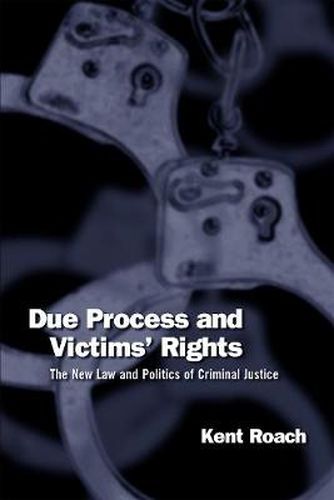Readings Newsletter
Become a Readings Member to make your shopping experience even easier.
Sign in or sign up for free!
You’re not far away from qualifying for FREE standard shipping within Australia
You’ve qualified for FREE standard shipping within Australia
The cart is loading…






In Due Process and Victims’ Rights Kent Roach critically examines dramatic changes in criminal justice in the last two decades. He argues that increasing concern by courts about the rights of those accused of crime and by legislatures about the rights of crime victims and groups who are disproportionately subject to some crimes, such as women and children, has transformed debates about criminal justice. He examines recent cases in which due process and victims’ rights have clashed and concludes that, in most instances, victims’ rights claims have ultimately prevailed. He concludes that the future of criminal justice will depend on whether victims’ rights continue to develop in a punitive fashion or whether they inspire increased emphasis on crime prevention and restorative justice.
This is the first full-length study of the law and politics of criminal justice in the era of the Charter and victims’ rights. It examines changing discourse in the courts, legislatures, and media, and the role of women, young people, minorities, Aboriginal people, and crime victims in criminal justice reform. It builds new models of criminal justice based on victims’ rights as alternatives to Herbert Packer’s famous due process and crime control models. Roach draws on criminology literature about the growth of a ‘risk society,’ in which the risk of crime is more easily calculated and controlled, as well as writings concerned with restorative and Aboriginal justice.
$9.00 standard shipping within Australia
FREE standard shipping within Australia for orders over $100.00
Express & International shipping calculated at checkout
In Due Process and Victims’ Rights Kent Roach critically examines dramatic changes in criminal justice in the last two decades. He argues that increasing concern by courts about the rights of those accused of crime and by legislatures about the rights of crime victims and groups who are disproportionately subject to some crimes, such as women and children, has transformed debates about criminal justice. He examines recent cases in which due process and victims’ rights have clashed and concludes that, in most instances, victims’ rights claims have ultimately prevailed. He concludes that the future of criminal justice will depend on whether victims’ rights continue to develop in a punitive fashion or whether they inspire increased emphasis on crime prevention and restorative justice.
This is the first full-length study of the law and politics of criminal justice in the era of the Charter and victims’ rights. It examines changing discourse in the courts, legislatures, and media, and the role of women, young people, minorities, Aboriginal people, and crime victims in criminal justice reform. It builds new models of criminal justice based on victims’ rights as alternatives to Herbert Packer’s famous due process and crime control models. Roach draws on criminology literature about the growth of a ‘risk society,’ in which the risk of crime is more easily calculated and controlled, as well as writings concerned with restorative and Aboriginal justice.